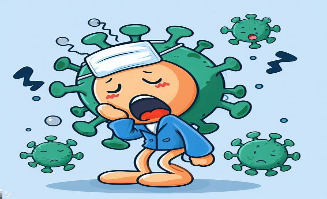By Andrea Kane, CNN, November 9, 2023
(CNN) — Brain fog, fatigue, heart palpitations, post-exertional malaise and dizziness are a handful of the symptoms associated people with long Covid in adults.
They are among the 12 symptoms identified as part of the National Institute of Health’s RECOVER initiative that can be reliably used to classify someone as having long Covid.
The rest are gastrointestinal distress, chronic cough, thirst, chest pain, abnormal movement, changes in sexual desire or capacity, and a change or loss of smell and taste.
If you have experienced a certain number of these symptoms (they are weighted according to how specific to long Covid they are) then you may be one of the up to 23 million people in the United States who had or still has this condition.
Since the early days of the pandemic, it quickly became clear that some people who caught SARS-CoV-2 – the coronavirus that causes Covid-19 – did not fully recover. They continued to experience often debilitating symptoms for weeks, months and in some cases, years after their initial infection.
Doctors, researchers and health authorities were skeptical at first — and then stumped. They struggled to define and measure long Covid, to identify a cause for or a mechanism behind it. And to figure out which factors put people at higher risk of developing it.
While we have come a long way since the early days of the pandemic, many questions still remain, including how to prevent it in the first place (HINT: getting vaccinated against Covid seems to lower your risk even if you do get infected) and how to best treat symptoms once they emerge.
Almost 7% of adults and 1% of kids have struggled with long Covid, survey finds
Long Covid is not somebody else’s problem: a 2022 National Center for Health Statistics survey estimated that almost 7% of US adults, and more than 1% of children, who reported having Covid have struggled with long Covid at some point.
While the number of cases of long Covid have fallen since 2022 and many people recover to different degrees, people continue to get diagnosed with the illness and struggle with symptoms.
One of the most vexing symptoms that many patients report is brain fog, according to David Putrino, a neuroscientist and the director of Rehabilitation Innovation at the Mount Sinai Health System, in New York City.
“We’re starting to learn a lot more about what is happening in the brain during an acute Covid infection,” Putrino told CNN Chief Medical Correspondent Dr. Sanjay Gupta recently on his podcast Chasing Life.
Putrino said that researchers in the UK found “alarming changes” in brain size and cognitive function after a Covid infection, even in people who didn’t report experiencing long Covid. The study was published in the journal Nature in 2022. “Their brains had been changed,” said Putrino.
Another common complaint, said Putrino, is post-exertional malaise, which is the worsening of symptoms following even minor physical or mental exertion.
Scientists edge closer to finding a biomarker for long Covid, which could lead to better tests and treatments
“They didn’t say ‘post-exertional malaise.’ No one knew what post exertional malaise was, but they would say things like, ‘I went to get my groceries and then I crashed,’” Putrino said.
“‘Crash’ was a big word that was being used. ‘I went downstairs. My groceries were delivered. Carrying them up the stairs back to my apartment caused me to crash, and I couldn’t get out of bed for two days.’”
Putrino said that the wide-ranging symptoms of long Covid may be caused by one or more underlying factors, including micro-clots which block small blood vessels and lead to problems such as cognitive issues; persistent viral particles that continue to circulate and stir up our immune system; and the inflammation of the vagus nerve which can result in dysautonomia and manifest as POTS, or postural orthostatic tachycardia syndrome.
